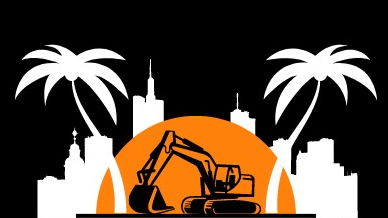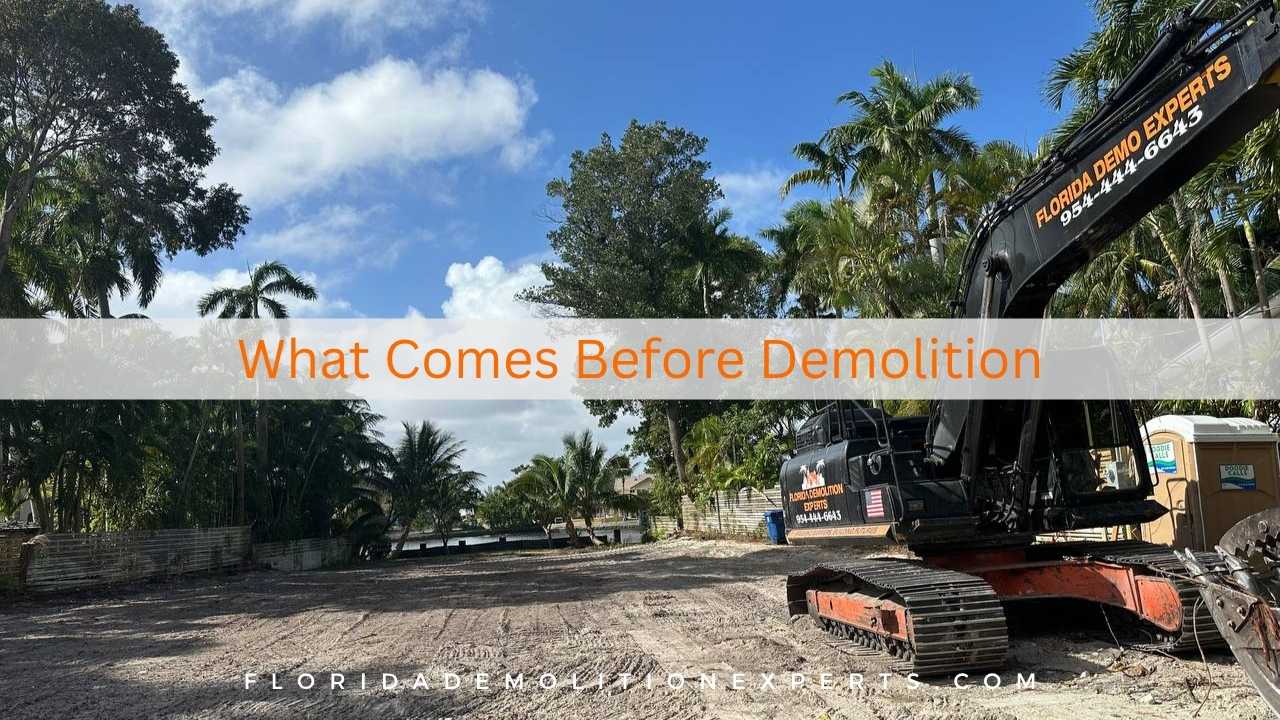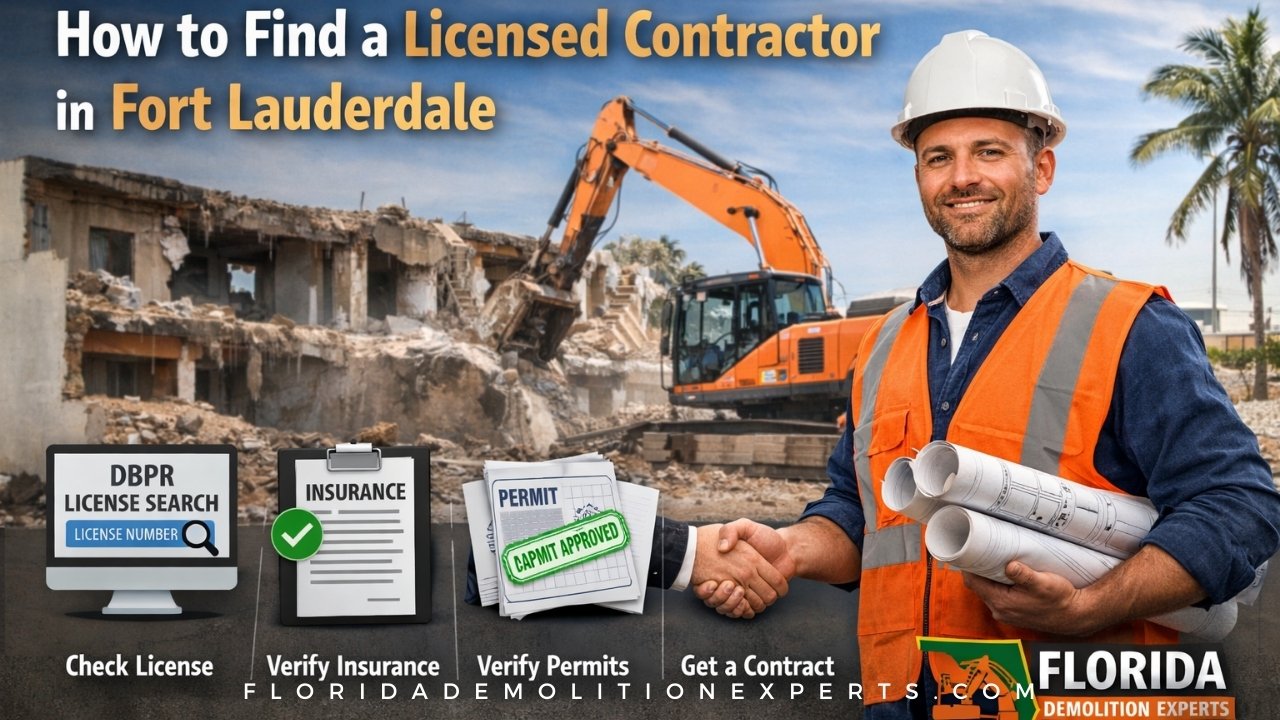What should you do before a single wall comes down? In Florida, residential demolition requires more than hiring a crew; it involves permits, inspections, and careful planning. So, what exactly comes before demolition, and why is getting it right so important?
Proper preparation ensures your project runs smoothly, legally, and without surprise costs, whether you’re preparing for a complete teardown or an interior gut job. Residential demolition in Florida involves more than just knocking down walls; it requires permits, planning, and professional coordination.
This article takes you behind the scenes of residential demolition prep, from inspections and paperwork to utility shutdowns and contractor selection.
If you skip these steps, you risk fines, delays, or endangering your property and community. Are you ready to do it right?
Step 1: Define the Scope of Demolition
Not all demolitions are the same. Your first task is identifying what type of demolition project you’re undertaking:
- Complete residential demolition: Removing the entire structure down to the foundation
- Partial demolition: Tearing down specific sections like garages, porches, or extensions
- Interior/selective demolition: Removing non-structural elements like walls, flooring, or fixtures for remodeling
Each type requires a different permitting process, timeline, and team of professionals. If you’re still unsure which route to take, read our guide: Interior Demolition vs. Full House Demolition: What’s the Difference.
Step 2: Schedule Professional Inspections
Before anything is removed or knocked down, Florida law often requires inspections for:
- Asbestos and lead-based paint (especially in homes built before the 1980s)
- Mold, pests, and structural issues
- Underground tanks, wells, or hazardous waste
These inspections aren’t just formalities; they help protect your family, workers, and the environment. Hazardous materials must be safely removed before demolition can proceed.
If your home contains these risks, they can’t legally be disturbed without proper removal and documentation. Skipping this step could halt your project and trigger steep penalties.
Step 3: Obtain the Necessary Permits
In Florida, you cannot legally begin demolition without a valid permit. Permits vary by municipality and are typically issued by your local building or code enforcement office.
Permit requirements often include:
- Property surveys or site plans
- Proof of utility disconnections
- Asbestos inspection documentation
- Environmental clearance (for coastal or protected areas)
For a deep dive into permitting, read: Do I need a permit for residential demolition in Florida?
Important note: Some cities like Miami, Orlando, and Tampa may require special approvals or neighborhood notifications. Always check local rules first.
Step 4: Disconnect Utilities Safely and Legally
One of the most overlooked (and dangerous) steps before demolition is shutting off utilities:
- Water and sewage
- Gas lines
- Electricity
- Internet and cable lines
You must coordinate directly with service providers and get official confirmation that utilities have been safely disconnected or capped. Leaving active connections can lead to fires, floods, explosions, or worse.
Step 5: Consider Salvaging Reusable Materials
Demolition doesn’t mean everything goes to waste. You can often salvage:
- Wood flooring and trim
- Doors, windows, and cabinetry
- Light fixtures and appliances
- Bricks and concrete pavers
- Copper and metal wiring
Salvaging not only reduces environmental waste but can also save money or even turn a profit if you resell items. For eco-conscious options, explore the environmental Impact of Residential Demolition in Florida.
Step 6: Hire the Right Demolition Contractor
This step can make or break your entire project. A licensed, insured, and experienced contractor ensures:
- Proper permit handling
- Safe demolition practices
- Timely execution
- Compliance with Florida building codes
- Coordination with inspectors and utility providers
Before signing any contract, check credentials, get multiple estimates, and review past work. A reputable contractor will gladly walk you through the process and help with paperwork.
Need help? Here’s our complete guide: How to choose a house demolition contractor in Florida.
Step 7: Notify Neighbors and Prepare for Site Cleanup
Demolition creates noise, dust, and debris. It’s respectful and often required to give nearby homeowners advance notice. If you live in a community with an HOA, check their requirements as well.
Also, plan how to handle waste removal and debris:
- Roll-off dumpsters or hauling services
- Local landfill regulations
- Recycling centers for construction waste
This preparation ensures you’re not left with a giant mess or a city fine.
Step 8: Confirm Timeline and Final Readiness
With all paperwork in hand, materials removed, and utilities shut off, it’s time to schedule the demolition. Always build in buffers for:
- Permit approval delays
- Contractor availability
- Weather conditions (especially during hurricane season)
Want to know how long it will all take? Read “How long does a demolition take, and what affects the timeline?”
Don’t Skip These Steps: Start Your Demolition Project Right
What comes before demolition isn’t just a checklist; it’s your foundation for success. From legal permits and inspections to safety, waste control, and contractor selection, every step ensures everything goes up smoothly when the walls come down.
FAQs: What Comes Before Demolition?
1. What is the first step before demolition?
You must identify the type of demolition and schedule professional inspections, especially for asbestos or hazardous materials.
2. Do I need a permit before starting demolition?
In Florida, a permit is required for any structural or interior demolition, and it must be obtained before work begins.
3. What happens if I skip the utility disconnection?
This is extremely dangerous. Live water, gas, or electricity lines can lead to serious accidents and legal trouble.
4. Can I handle demolition prep without a contractor?
While it’s possible, it’s not recommended. Florida’s rules are complex, and mistakes can delay your project or increase costs.
5. How much time should I allow for pre-demolition steps?
Plan for 4–6 weeks minimum. This allows for inspections, permits, utility arrangements, and contractor scheduling.
Let Florida Demolition Experts Handle It for You
Tackling pre-demolition prep alone can be overwhelming, confusing, and time-consuming. But you don’t have to do it alone.
At Florida Demolition Experts, we manage the entire process from permits and inspections to utility coordination and demolition. With decades of experience serving homeowners nationwide, we know Florida’s regulations.
Whether planning a complete teardown or an interior renovation, we’ll guide you through every step and deliver safe, efficient, and code-compliant results.
📞 Ready to get started? Contact us today for a free consultation and site evaluation.






